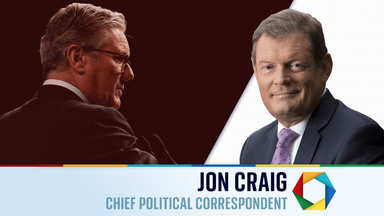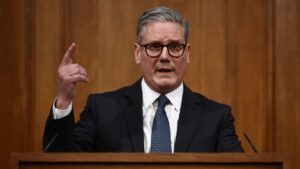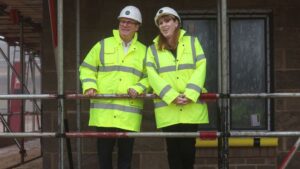Sir Keir Starmer appears to woo TUC – but trouble remains in Westminster
After his speech to the Trades Union Congress, Sir Keir Starmer dashed back to London as his government faces a vote on the winter fuel payment cut. His appearance at the congress was the first by a prime minister since 2009.

When Sir Tony Blair used to address the TUC conference, the joke was that he told his driver to keep the car engine running.
Sir Keir Starmer didn’t hang about here. He did take six questions after his speech, but he left the stage swiftly after that.
In fairness, the prime minister had pressing business in parliament, where his pesky backbenchers were still – as he left Brighton – threatening a rebellion on winter fuel payments.
Politics latest: MPs debate cut to winter fuel payments
But in the 40 minutes he was on the platform, Sir Keir delivered a predictably tough message to the unions: don’t expect big pay rises under a Labour government.
His Tory opponents would claim it’s a bit late for that message since the government has already offered inflation-busting pay rises to train drivers and junior doctors.
Given his tough tone, his reception here was never going to reach rock star proportions. And – harsh but fair – Sir Keir is never going to be a rock star politician like Sir Tony, Boris Johnson or Barack Obama.
But he did receive a standing ovation after his speech and Q&A, though not from everyone in the hall – and there were a few empty seats.
And twice during his speech, a lone female heckler shouted: “Tax the rich!” And no, it wasn’t Unite general secretary Sharon Graham, who’d made that demand in a fiery conference speech the previous day.
The key phrases in Sir Keir’s warning on pay were phrases like “I have to level with you”, “this will take a while”, “tough decisions” and “I owe you that candour”.

Keep up with all the latest news from the UK and around the world by following Sky News
But the phrase that really stood out in the speech was “working people”. He said it no fewer than 19 times. The message here was that despite all the accusations of austerity measures in the short term, the government is on the side of working people.
When it came to questions, the only challenging one of the six was on why Labour had not axed George Osborne’s two-child benefit cap. He talked about tackling child poverty, but didn’t give a definitive answer.
He must have been relieved that there was no question on winter fuel payments, although the suspicion at TUC conferences has always been that questions from the floor to a Labour leader are heavily vetted by the general secretary and his inner circle.
Read more:
MPs to vote on cutting winter fuel payment
Vote will test Sir Keir’s authority
Sir Keir had, of course, come to Brighton with good news and bad news. The good news was his commitment on Labour’s pledges on workers’ rights, which the unions are delighted about and grateful for. The bad news was on pay.
This was the first speech at a TUC conference by a Labour prime minister for 15 years, since Gordon Brown in Liverpool in 2009, when – yes, really – Irn Broon warned of spending cuts to come.
Be the first to get Breaking News
Install the Sky News app for free


Back then, Labour’s 13 years in government were coming to an end. Within a year of that Liverpool speech, Mr Brown had lost the 2010 election.
Sir Keir’s speech in Brighton, in contrast, came in the early weeks of a new Labour government. Surely a better time – especially with a stonking Commons majority – to warn of “tough decisions” than after more than 12 years in power.
👉 Tap here to follow Politics at Jack and Sam’s wherever you get your podcasts 👈
For that reason – and because the unions are so delighted to see the back of a Tory government after 13 years – most union leaders and activists here were prepared to give Sir Keir the benefit of the doubt on his tough economic message.
For now.
For Sir Keir, job done. Only a minor heckle and no walkouts or placard held up during his speech.
And his swift departure after the post-speech handshakes confirmed that the prime minister had bigger troubles to attend to back at Westminster.


